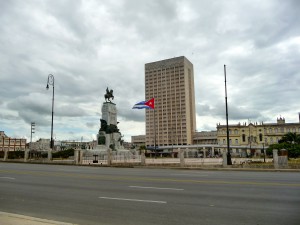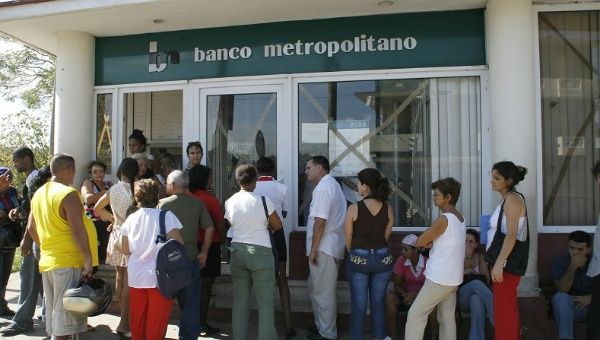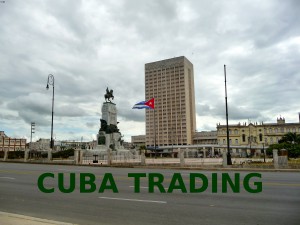Cuba Investment Trends
 Cuba’s changing business climate followed by the reestablishment of the diplomatic relations between Washington and Havana has brought to the island a flow of delegations of businessmen and diplomats from around the world, some of them curious to see what the local market has to offer while others are serious in their business proposals.
Cuba’s changing business climate followed by the reestablishment of the diplomatic relations between Washington and Havana has brought to the island a flow of delegations of businessmen and diplomats from around the world, some of them curious to see what the local market has to offer while others are serious in their business proposals.
Those who had not had the chance to travel to the island before, did not miss the opportunity to witness the best business fair of Havana (FIHAV). The largest in its history, with delegations from 70 countries -including 25 companies from the USA-, looking to consolidate or launch business, 10 more over the previous year, and all Cuban economic sectors were well represented.
Foreign investment is one of the pillars of the economic reforms undertaken in the Island. In order to attract the foreign capital needed to revitalize its economy, Cuba has updated its business portfolio, from which foreign direct investment flows could rise to $ 8.173 millions of dollars.
A significant development of this edition is the inclusion of the health sector. Three projects of facilities for health tourism; and health services related to sport. Which have the purpose of building two Vacation Hemodyalisis facilities centers, a international clinic sports and the construction of a center Quality of life services for which is need 42.5 millions USD.
It’s important to highlight the wholesale business which offers a range of opportunities and its need for foreign immediate economic boost.
With the rapid growth of tourism in Cuba, it seeks to renovate its most import ports facilities -Havana, Cienfuegos, Santiago de Cuba, Sancti Spiritus and Holguín- associated with this activity. The Development of the 5 cruise-line terminals need around $ 74 millions UDS.
To provide mooring services, passenger transit services through the terminals, facilities to provision
the ships, leasing offices and space, transit customs warehouses, dock pass services for automóviles These projects aim to:
As evidence of of the rapid and non-stop changes taking place on the island, the Office of the Special Development Zone Mariel (ZEDM) officially presented the eight users approved to date to settle in the area.
The companies established in the area, are Container Terminal Mariel (TCM) S.A. (Cuba); meat-packer Richmeat (Mexico), Profood Service (Spain), a supplier of food and beverage for the tourism sector; BDC-Log S.A and BDC-Tec S.A (both Belgium), the first providing logistics services and the second focus on water treatment with cutting-edge technology ; DEVOX General Paint (Mexico); and BRASCUBA Cigarettes (Brazil / Cuba).
US: Treasury and Commerce Announce Further Amendments to the Cuba Sanctions Regulations
Amendments Further Implement President Obama’s 2014 Announcement Related to the Easing of Cuba Sanctions.
The Department of the Treasury and the Department of Commerce are announcing additional revisions to the Cuban Assets Control Regulations (CACR) and Export Administration Regulations (EAR), building off the changes put into place by Treasury and Commerce on January 16, 2015 and further delivering on the new direction toward U.S. relations with Cuba that President Obama laid out last December. The changes, consistent with the President’s December announcement, will take effect on Monday, September 21, 2015, when the regulations are published in the Federal Register. A fact sheet detailing the revisions, which will be administered by Treasury’s Office of Foreign Assets Control (OFAC) and Commerce’s Bureau of Industry and Security (BIS), is below.
Travel –
Transportation by vessel of authorized travelers – between the United States and Cuba only and without stops in third countries – will be authorized by general license.
Close relatives now also will be allowed to visit or accompany authorized travelers for additional educational activities, journalistic activity, professional research, and religious activities, as well as activities related to humanitarian projects and activities of private foundations or certain research or educational institutes.
All authorized travelers will be allowed to open and maintain bank accounts in Cuba in order to access funds for authorized transactions while in Cuba.
Telecommunications & Internet-Based Services –
Persons subject to U.S. jurisdiction will be allowed to establish a business presence in Cuba, including through joint ventures with Cuban entities, to provide certain telecommunications and internet-based services, as well as to enter into licensing agreements related to, and to market, such services.
Persons subject to U.S. jurisdiction will be allowed to import Cuban-origin mobile applications into the United States and to hire Cuban nationals to develop them.
Commercial and Financial Transactions –
All persons subject to U.S. jurisdiction will be allowed to provide goods and services to individual Cuban nationals located outside of Cuba, provided there is no commercial exportation of goods or services to or from Cuba.
Banking institutions will be able to open and maintain accounts for Cuban individuals for use while the Cuban national is located outside of Cuba, and to close such accounts.
Physical Presence and Operations in Cuba –
Persons subject to U.S. jurisdiction engaging in the following categories of authorized activities will be allowed to establish and maintain a physical presence, such as an office, retail outlet, or warehouse, in Cuba: news bureaus; exporters of certain goods authorized for export or reexport to Cuba by Commerce and OFAC, such as agricultural products and materials for construction or renovation of privately-owned buildings; entities providing mail or parcel transmission services or certain cargo transportation services; providers of telecommunications or internet-based services; entities organizing or conducting educational activities; religious organizations; and providers of carrier and certain travel services. These individuals and entities will also be authorized to employ Cuban nationals, open and maintain bank accounts in Cuba, and employ persons subject to U.S. jurisdiction in Cuba.
Remittances –
The limits on donative remittances to Cuban nationals other than prohibited Cuban Government or Cuban Communist Party officials, currently set at $2,000 per quarter, will be removed entirely. The limits on authorized remittances that individuals may carry to Cuba, previously $10,000 for persons subject to U.S. jurisdiction and $3,000 for Cuban nationals, will also be removed entirely.
Remittances from Cuba and from Cuban nationals in third countries to the United States will be authorized by general license, and financial institutions will be allowed to provide related services.
Legal Services –
A new general license will authorize persons subject to U.S. jurisdiction to receive, and make payment for, certain legal services from Cuba or Cuban nationals.
Humanitarian Projects –
The license authorizing transactions related to specified humanitarian projects will be expanded to include disaster relief and historical preservation.
Cuba: Private Sector Workers Access Internet Banking
 Online banking arrives in Cuba on the back of improved Internet access and a growing private sector.
Online banking arrives in Cuba on the back of improved Internet access and a growing private sector.
Private entrepreneurs in Cuba are benefiting from new bank services launched on Monday, as the private sector experiences a boom, prompted by the government’s partial deregulation of economic policies in recent years.
In a first, self-employed workers will now be able to manage their accounts online, said Director Greicher La Nuez from the Popular Bank of Saving (BPA), meaning no more waiting in long bank queues.
This services is now possible thanks to growing internet access, developed over the past few months.
La Nuez added that the bank is also looking at ways to allow business owners to pay their employees via remote banking.
Another service on trial, she said, would allow workers from the private sector to manage their funds via check books and credit cards.
Published by Tele Sur
Cuba: Import/Export ( Gov’t contract)
 Foreign companies interested in pursuing contracts with the Cuban state-owned enterprises have to introduce their company to potential government’s representatives, to research the Cuban marketplace for available opportunities, and understand how it works.
Foreign companies interested in pursuing contracts with the Cuban state-owned enterprises have to introduce their company to potential government’s representatives, to research the Cuban marketplace for available opportunities, and understand how it works.
Some facts to take into consideration:
It is not a free market
Most of the Cuban economy is under state ownership, which means the market is controlled and regulated by government policy, thus based on the fact that your partner will be the government, the competition is almost zero.
Assessment and acceptance
As probably most of you know, selling to the government is different than selling to a private sector, and Cuba isn’t an exception. You should make sure you know your own company inside and out. Experience counts, and the government also looks for financial stability; which indicates you’ll be in business in the years to come.
In short you have to prove who you are what you do.
Public procurement
The government purchases goods and services, which must meet certain requirements, such as the best possible cost to meet the needs in terms of quality and quantity. Your products or services need to be aligned with the Cuban economic model in terms of improvements and social interest.
To facilitate public procurement your company should be registered with the state-run agencies to be placed on potential supplier lists. If you are ready to bid on government contracts, it’s necessary to submit your business profile to the government agencies that are used to locate contractors.
Build a relationship
Government officials are also human beings, and therefore they like you also need to know the person behind the potential partner. Get your foot in the door, go to Cuba and meet them, participate in their business events, show your interest, it will help you know better marketplace opportunities and figure out if there is a real business opportunity for you.
Wholesale and Retail business are run by agencies set up as corporations by the government. Forget about the idea of your home rules related to exporting/importing your goods and services by yourself, it doesn’t apply, getting a government contract is the way to go.
Tomorrow the White House is expected to remove Cuba from the list of state sponsors of terrorism
A Brief History of U.S. – Cuba Relations ABC News Videos
The time frame for the US Congress to challenge a decision by President Obama to remove Cuba from a list of state sponsors of terrorism, will expire tomorrow.
Trading between Cuban entrepreneurs and the US
 Can American citizens import any goods from Cuban entrepreneurs?
Can American citizens import any goods from Cuban entrepreneurs?
If true, it’s hardly inspirational for the Cuban entrepreneurs. On the other hand looking to the bright side of such “opportunity”, it can be the push to demonstrate our creativity skills.
If we take a look at the list of products which are not allowed to be imported into the United States & knowing the basic material (raw material ) used for its production it’s controlled by state-owned Cuban enterprises, we’ll realize why they don’t fall within the category.
Thus, what is allowed?
Everything else which is not in the list as long as it complies with the regulation in force.
Nevertheless it hasn’t caught us by surprise to know that the new regulation allows to import services from the Cuban private sector, if we take into account that Americans may hire well qualified Cuban professionals, such as accountants, designers, programmers, translators among others, as long as they can prove that they are independent entrepreneurs, cooperatives or self-employed. It doesn’t sound like a bad deal. Win-win?
The United States to indicate categories of goods that are not eligible for import into the United States pursuant to § 515.582, even if such goods were produced by independent Cuban entrepreneurs; any other goods produced by independent Cuban entrepreneurs and not covered by the listed sections and chapters of the HTS may be imported. All services supplied by independent Cuban entrepreneurs are eligible for import.
Easing the trade between Cuban entrepreneurs and American citizens. Who holds the aces?
